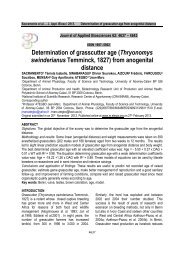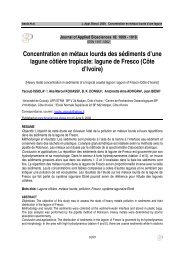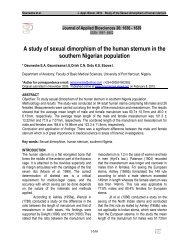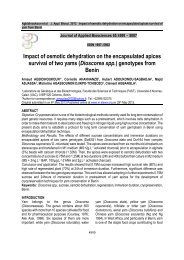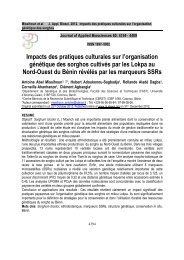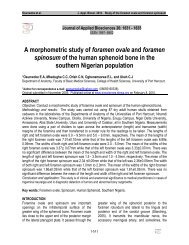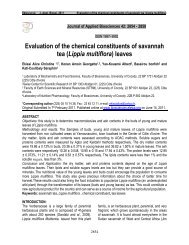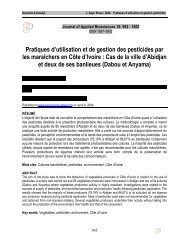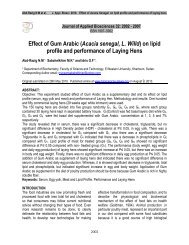Biofuels in Tanzania: Status, Opportunities and Challenges
Biofuels in Tanzania: Status, Opportunities and Challenges
Biofuels in Tanzania: Status, Opportunities and Challenges
Create successful ePaper yourself
Turn your PDF publications into a flip-book with our unique Google optimized e-Paper software.
Anthony M. Msh<strong>and</strong>ete.J. Appl. Biosci. 2011. <strong>Biofuels</strong> <strong>in</strong> <strong>Tanzania</strong>: <strong>Status</strong>, <strong>Opportunities</strong> <strong>and</strong> challengesCONCLUSIONSThis is a first ever-comprehensive review, whichcategorized issues <strong>and</strong> provided the status of eachissues perta<strong>in</strong><strong>in</strong>g to biofuels <strong>in</strong> <strong>Tanzania</strong>. The reviewalso highlighted the gaps <strong>and</strong> proposed strategies ofaddress<strong>in</strong>g the gaps related to opportunities/prospects,challenges/risks/constra<strong>in</strong>s of the relatively newbiofuels sector. In this review it was revealed that<strong>Tanzania</strong> has great potential for biofuel production dueto the availability of l<strong>and</strong> resource, high yield biofuelfeedstock’s, water resources, relative conduciveclimatic conditions <strong>and</strong> cheap labor force. It was alsolearnt that <strong>Tanzania</strong> could benefit if it chooses toengage <strong>in</strong> this biofuels opportunity by align<strong>in</strong>g <strong>in</strong>dustrysusta<strong>in</strong>ability <strong>and</strong> development goals. However, there isneither biofuel policy nor strategies to regulate biofuel<strong>in</strong>dustry although there some guidel<strong>in</strong>es developed byNBTF. Even without the biofuel policy however<strong>in</strong>vestments have been go<strong>in</strong>g on. Mult<strong>in</strong>ationalcompanies/<strong>in</strong>vestors have started large-scaleproduction of biofuels ma<strong>in</strong>ly for export. At the momentbiofuel production <strong>and</strong> process<strong>in</strong>g <strong>in</strong> <strong>Tanzania</strong> is at itsACKNOWLEDGEMENTSI would like to express my gratitude to the RegionalAgriculture <strong>and</strong> Environment Initiatives Network(RAEIN-Africa) for provid<strong>in</strong>g guidel<strong>in</strong>es to carry out thiscomprehensive desk study on status of biofuels <strong>in</strong><strong>Tanzania</strong>. I also s<strong>in</strong>cerely acknowledge RAEIN-Africafor f<strong>in</strong>ancial support to attend <strong>and</strong> present the f<strong>in</strong>d<strong>in</strong>gsof this study on the conference on “Mitigation <strong>and</strong>made from organic waste are environmentallymore benign than biofuels from energy crops.Us<strong>in</strong>g biomass primarily for material purposesreus<strong>in</strong>g <strong>and</strong> recycl<strong>in</strong>g it, <strong>and</strong> then recover<strong>in</strong>gits energy content can ga<strong>in</strong> multiple dividends.In <strong>Tanzania</strong> the current move towards biofuelproduction is necessitated by a number of factors,which are analogous to the concerns such as impact onclimate echoed <strong>in</strong> the rest of the world. With regard toJatropha, one recent study on l<strong>and</strong> clear<strong>in</strong>g <strong>and</strong>greenhouse gas emissions from Jatropha biofuels onAfrican miombo woodl<strong>and</strong> <strong>in</strong> <strong>Tanzania</strong> concluded thatthe carbon condition of soils appears to be moresignificant for the emissions balance than biomass <strong>and</strong>that whether net emissions reductions are achieveddepends on the level of degradation of the ecosystem<strong>and</strong> alternative l<strong>and</strong> uses (Romijn, 2009). Although ithas been generally concluded recently by Action Aid(2010) that the <strong>in</strong>dustrial biofuels are the least costeffectiveway of sav<strong>in</strong>g GHG emissions <strong>and</strong> theirsuitability <strong>in</strong> the fight aga<strong>in</strong>st climate change isuncerta<strong>in</strong>. However, us<strong>in</strong>g best agriculturalmanagement practices could reduce many of thenegative biofuels impacts on climate, although choiceof feedstocks <strong>and</strong> systems, <strong>and</strong> the overall dem<strong>and</strong>rema<strong>in</strong> critical. In addition, other environmentalparameters such as negative impacts on naturalresources must also be taken <strong>in</strong>to consideration.Analytical tools such as life cycle analysis (LCA) canhelp identify the best environmental alternatives;however, social parameters have to be <strong>in</strong>novatively<strong>in</strong>tegrated <strong>in</strong> LCA. There is simply not enough l<strong>and</strong> toproduce sufficient biofuel for global liquid fuel needs.F<strong>in</strong>ally, it should be noted that <strong>in</strong>vestment <strong>in</strong> biofuels isa relatively expensive way to reduce global greenhousegas emissions. Other measures of exploit<strong>in</strong>g otherrenewable energy sources may be more cost-effective<strong>in</strong>novations.<strong>in</strong>fant stage <strong>and</strong> there are no commercial production ofbiofuels (ethanol <strong>and</strong> biodiesel). There is only smallscale production of straight vegetable oil (SVO) from oilseeds, e.g. Jatropha, oil palm, etc do exist which ispromoted by local private companies <strong>and</strong> NGOs. Thebiofuels <strong>in</strong>dustry has potential for diversification of<strong>in</strong>come particularly for rural poor small-scale farmersbut the challenge is how to <strong>in</strong>tegrate them <strong>in</strong> the biofuelvalue cha<strong>in</strong> <strong>and</strong> how will be the distribution of returnsamong economic agents <strong>in</strong>volved <strong>in</strong> the <strong>in</strong>dustry. Atleast with the prevail<strong>in</strong>g biofuel <strong>in</strong>vestment pattern <strong>in</strong><strong>Tanzania</strong>, biofuels are likely to have negative impact onfood security, biodiversity, <strong>and</strong> l<strong>and</strong> issues if there is nowell thought policies put <strong>in</strong> place to regulate the<strong>in</strong>dustry. Biofuel policy will be most successful only if<strong>in</strong>tegrated <strong>in</strong> comprehensive plans for climate,biodiversity, food <strong>and</strong> energy security. Therefore,proper consideration <strong>and</strong> management of the potentialnegative effects of the biofuel <strong>in</strong>dustry is required, toensure benefits out weigh any ecological, economic<strong>and</strong>/or social costs.Adaptation Strategies to Climate Change <strong>and</strong>Innovation Systems <strong>in</strong> Southern Africa” Held atBirchwood Hotel, Johannesburg, South Africa 23-25,March 2010. A fund to publish this paper provided byDirectorate of Research at University of Dar es Salaamis highly appreciated.2700



